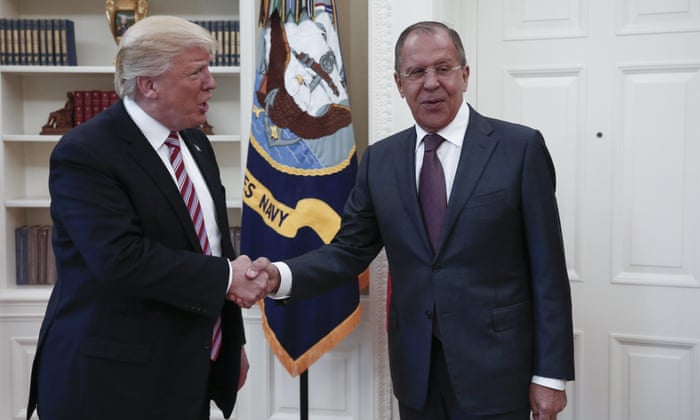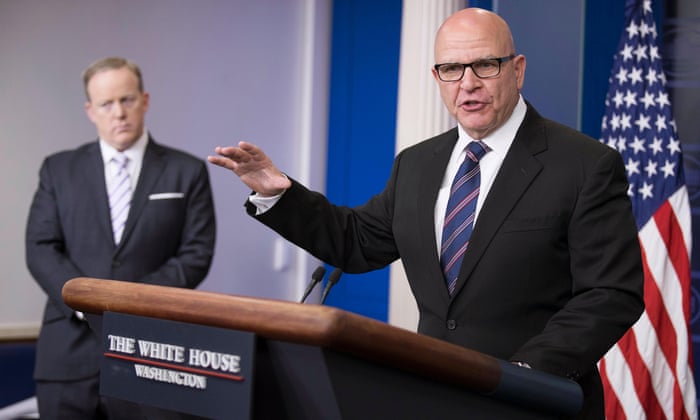A Brief Colonial History Of Ceylon(SriLanka)
Sri Lanka: One Island Two Nations
A Brief Colonial History Of Ceylon(SriLanka)
Sri Lanka: One Island Two Nations
(Full Story)
Search This Blog
Back to 500BC.
==========================
Thiranjala Weerasinghe sj.- One Island Two Nations
?????????????????????????????????????????????????Wednesday, May 17, 2017
Trump stands by 'absolute right' to share sensitive information with Russia
- Trump reportedly shared Israeli intelligence related to Isis plot
- Politicians and intelligence officials concerned information put sources at risk
- Donald Trump’s Russia revelations stoke the chorus for impeachment
Trump with the Russian foreign minister, Sergei Lavrov, in the Oval Office last week. Trump’s Tuesday tweets contradicted flat denials issued by senior officials on Monday night. Photograph: Tass/Barcroft


The
national security adviser, HR McMaster, takes questions from the press,
as Sean Spicer looks on. McMaster said the real threat came from leaks
to the press. Photograph: Shawn Thew/EPA
Julian Borger and Sabrina Siddiqui in Washington and Amanda Holpuchin New York-Tuesday 16 May 2017
 Donald Trump has
declared he had an “absolute right” to share information of a terrorist
plot with Russia amid widespread reports he gave away highly classified
information provided by Israeli intelligence.
Donald Trump has
declared he had an “absolute right” to share information of a terrorist
plot with Russia amid widespread reports he gave away highly classified
information provided by Israeli intelligence.
 Donald Trump has
declared he had an “absolute right” to share information of a terrorist
plot with Russia amid widespread reports he gave away highly classified
information provided by Israeli intelligence.
Donald Trump has
declared he had an “absolute right” to share information of a terrorist
plot with Russia amid widespread reports he gave away highly classified
information provided by Israeli intelligence.
Israel quickly declared it had “full confidence” in its
intelligence-sharing agreement with the US, but there was no evidence
that it had been consulted on a decision to share a tip-off - a decision
the president appears to have made on the spur of the moment in a
meeting last week with the Russian foreign minister, Sergei Lavrov, and
the Russian ambassador to the US, Sergey Kislyak.
The intelligence Trump shared involved an Islamic State plot to use
bombs hidden in laptop computers to bring down planes, according to the
Washington Post, which first reported the incident. White House
officials confirmed that it concerned a threat to aviation and argued it
was appropriate to share such information with Russia, which has also
been the victim of terrorism. They pointed to a 2015 terrorist attack on a Russian plane over Egypt.
Multiple US news organisations reported the source of the information
was Israel, days before Trump is due to visit Jerusalem on Monday – a
visit that has already been affected by a row with the host government
over the president’s plan to visit the Western Wall without the Israeli
prime minister, Benjamin Netanyahu.
The Israeli embassy did not confirm or deny the reports that it was the
source of the intelligence, but the ambassador, Ron Dermer, issued a
statement saying: “Israel has full confidence in our
intelligence-sharing relationship with the US and looks forward to
deepening that relationship in the years ahead under President Trump.”
It was unclear on Tuesday whether a planned speech by Trump at the
ancient fort of Masada would go ahead as planned. McMaster did not
mention it in laying out an agenda for the president’s first trip
abroad, which begins on Friday with a first stop in Saudi Arabia.
The US national security adviser, HR McMaster, said that the president had not been aware of the source of the information he had shared.
One of the powers of a US president is to declassify information at any moment he chooses. Trump’s Tuesday morning tweets did not specify whether the information he shared with Russia was classified.
“As president, I wanted to share with Russia (at an openly scheduled WH
meeting) which I have the absolute right to do, facts pertaining to
terrorism and airline flight safety,” Trump wrote. “Humanitarian reasons, plus I want Russia to greatly step up their fight against Isis and terrorism.”
Trump’s tweets contradicted flat denials issued by senior officials on
Monday night, and the White House declared the report to be false. On
Tuesday, McMaster offered a more calibrated response.
Trumps’ comments to Russian officials ‘appropriate to the conversation’ says HR McMaster
“What I’m saying is that the premise of the article was false – that in
any way the president had a conversation that was inappropriate or that
resulted in any kind of lapse in national security,” McMaster said. He
argued that the real security threat came from the leaks to the press.
McMaster refused to confirm or deny whether Trump had shared classified
information with Lavrov and Kislyak, repeatedly describing what Trump
had revealed as being “appropriate to the conversation” and saying that
the president had decided to release it “in the context of the
conversation” in the Oval Office.
McMaster said that Trump had not revealed intelligence sources or
methods, but he did tacitly confirm that the president had named the
Syrian city in which the intelligence had been collected. “It was
nothing you wouldn’t know from open source reporting,” he said. “And it
had all to do with operations that are already ongoing, had been made
public for months.”
He also did not dispute that the president’s counter-terrorism adviser,
Tom Bossert, had called the intelligence agencies to let them know about
the incident. He said he had not talked to Bossert, a key subordinate,
but suggested the call could have been made “out of an abundance of
caution”.
The affair has sparked an uproar over whether Trump compromised national
security and made it less likely that US allies would share
intelligence with Washington. It added to already intense scrutiny of
the president’s ties with Moscow.
Russia’s foreign ministry spokesperson, Maria Zakharova, said on
Facebook on Tuesday said the reports were “yet another fake” – and
advised people not to read American newspapers.
Top politicians and intelligence officials said they were concerned the
information potentially put a source at risk and was given to the US by an ally who did not give consent for it to be shared with Russia. Such a move could jeopardize existing relationships with allies familiar with Isis operations.
“The Israelis can’t avoid seeing a delicious irony. US intelligence
agencies, for decades, have suspected that Israel sometimes passes
information to Russia –
as part of trading intelligence – and that was the CIA’s reason to be
reluctant in sharing everything with the Israelis,” said Dan Raviv, a
journalist and author of several books on espionage in the Middle East.
“Now, America’s allies seem concerned that Trump himself might be
passing sensitive intel to the Russians.”
Burkhard Lischka, a senior German lawmaker, told the Associated Press
that the reports were concerning. “If it proves to be true that the
American president passed on internal intelligence matters, that would
be highly worrying,” Lischka said.
An official from an unnamed European country told the Associated Press
that the country might stop sharing intelligence with the US in light of
Trump’s disclosures to Russia.
Mitch McConnell, the Senate majority leader, lamented what he deemed to be a distraction from the Republican policy agenda.
“I think we could do with a little less drama from the White House on a
lot of things,” McConnell told Bloomberg TV on Tuesday, “so that we can
focus on our agenda, which is deregulation, tax reform, and repealing
and replacing Obamacare.”
Other Republicans were more outspoken in their criticism of the
president. Arizona senator John McCain said the reports were “deeply
disturbing” and sent “a troubling signal to America’s allies and
partners around the world and may impair their willingness to share
intelligence with us in the future”.
McCain said: “Regrettably, the time President Trump spent sharing
sensitive information with the Russians was time he did not spend
focusing on Russia’s aggressive behavior, including its interference in
American and European elections, its illegal invasion of Ukraine and
annexation of Crimea, its other destabilizing activities across Europe, and the slaughter of innocent civilians and targeting of hospitals in Syria.”
Senator Bob Corker, the chair of the Senate foreign relations committee,
warned that Trump’s White House must urgently reverse the “downward
spiral” it finds itself in. “The White House has got to do something
soon to bring itself under control and in order,” he said. “It’s got to
happen.”
The Washington Post’s reporting cited current and former US officials.
The allegations were confirmed by several other US news outlets on
Monday night.
The FBI and the Senate and House intelligence committees are conducting
separate investigations into Russian interference in the presidential
election, which the US government has said was designed to boost Trump’s
candidacy.
As president, Trump has continued to downplay the threat posed by Russia
while lavishing praise on Vladimir Putin. He has dismissed the
inquiries into his potential links to Russia as “fake news” – even as a
number of his former campaign aides have had contacts with Russian
operatives.
Trump’s former national security adviser, Michael Flynn, was forced to
resign in February for secretly discussing US sanctions against Russia
with Kislyak, and then misleading the vice-president, Mike Pence, about
the nature of his conversations. Jeff Sessions, the attorney general and
a vocal surrogate of Trump’s during the campaign, recused himself from
the FBI investigation into Russia after failing to disclose his own
meeting with Kislyak in his confirmation hearing before the US Senate.
Two former Trump aides, his former campaign manager Paul Manafort and
informal adviser Carter Page, have had ties to Russia and pro-Kremlin
operatives.

